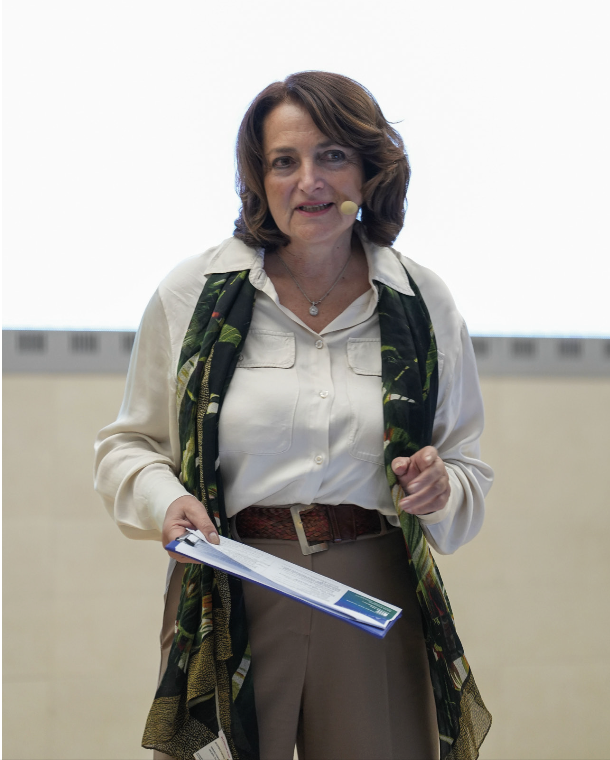
It may seem like an oxymoron to talk about simplicity in relation to an issue as complex as humanity grappling with the challenge of climate change. The image on this cover, which is the work of one of the young artists who won the EvolveArt contest on the theme of energy transition, sponsored by MAIRE and the Fondazione MAIRE - ETS, expresses this very contradiction.
The climate challenge is one of the most complex problems facing humanity since its evolution began. The goal of improving the quality of people's lives, making food, consumer goods, buildings and infrastructure more readily available and increasing connectivity, all without depleting resources, releasing climate-changing gases into the atmosphere and undermining the balance of the planet in order to protect future generations and the survival of the human species for centuries to come is a truly gigantic undertaking.
The international scientific effort to measure the magnitude of the climate change phenomenon, project its evolution and estimate its various scenarios is enormous. So too is the multilateral effort required of governments around the world to make sure that the solutions found to ensure the sustainability of development will be achieved and shared in an equitable way. These are the efforts being made at the climate conferences, called COPs, where countries so different in size, bearing, culture, and economic circumstance work together to find shared solutions. In this issue of Evolve we will also talk about the contribution that we, in our own small way, brought to the last COP29 held in Azerbaijan.
Simplicity is the only thing that can lay the groundwork for some of the fundamental premises that will guide this wager humanity has made.
First and foremost, simplicity is solving a problem by breaking it down, tackling it one piece at a time, as we have explained in detail in one of the articles in this issue. The ability to break down problems is an attribute of engineers and one of the essential qualities of professionals who will work in the energy transition, able to deal with situations that have a high degree of complexity with discipline, critical spirit, and vision. Our “humanist engineers”.
Think of the complexities of transforming a linear economy into a circular one, of creating a hydrogen economy, of changing the transportation sector by changing the way fuels are produced, the means of transportation, and the infrastructure "ports, airports, and roads). Challenges that contain conflicting variables.
In the challenge of the circular economy, there are so many variables to govern: composition and origin of waste, technical difficulties of treatment and recycling, regulatory constraints and targets, the opposition of communities to the construction of plants that manage waste on their local territory "the so-called NIMBY syndrome, Not In My Back Yard), the confidence of governments with respect to new technologies, their financing, the containment of the costs of the recycling process in order to obtain a product that is economically viable in the market and the competition between products derived from linear versus circular economies.
Among the variables in the hydrogen challenge are issues related to the costs of different ways of producing a low-emission hydrogen, the technical and safety aspects of storing and transporting hydrogen produced on a large scale and the development of demand that must go hand in hand with the development of production and distribution infrastructure.
There are many variables in the transportation challenge, from the availability – limited and with competitive overlaps – of raw materials with which to produce biofuels, to the costs, including the social costs, of converting entire sectors "e.g., the automotive sector to electric), from the safety aspects of new power modes to the affordability of innovative means of transportation and the availability of alternative fuels in adequate and stable volumes in different geographies, a key element when it comes to intercontinental shipping or air transport.
Developing technologies such as those proposed by NEXTCHEM – as you will see in the article written by our CEO Alessandro Bernini – and developing industrial projects in an ever-changing environment requires a great deal of analytical skill in breaking down problems and translating complexity into simplicity.
Simplicity as a result becomes positive thinking, seeing challenges as opportunities, mistakes as learning moments. This aspect has a strong organizational value, as colleague Max Panaro's article tells us. Positive thinking makes people and organizations much more resilient. At MAIRE, for example, sustainability is neither a problem nor a burden, but rather a competitive challenge, an opportunity to open up new areas of business and find new solutions to propose to its clients and develop alongside its suppliers. A road strewn with potential errors simply because it is charted in an uncertain environment that is changing daily, one in which error is an almost crucial part of gaining experience and where it is necessary to learn to make mistakes.
Simplicity sets an example. Companies change and in doing so create a cascading effect both upstream and downstream along their value chain. Our Group is shifting its focus, investing in change toward the energy transition, and in doing so we are propelling our supply chain and the marketplace towards change while enabling concrete and measurable change with our technologies and with an increasingly attentive and discerning approach to issues of sustainability.
Simplicity is equity, the concept that inspires MAIRE's social responsibility initiatives, aimed at local communities in need of support
in education, for example on the topic of circular economy and proper waste management. It also inspires, among others, the Fondazione MAIRE's initiatives on the topic of educational poverty, such as
the MAIREmpower project described in this issue of the magazine,
where we go to suburban areas to talk about energy transition with
the aim of supporting girls and boys from fragile backgrounds in their
post-secondary education.

Act with simplicity is a MAIRE motto that we need to make our own and which must inspire us every day to ensure the resilience and success of our company.
Ilaria CatastiniGeneral Director of Fondazione MAIRE - ETS and Head of Group Sustainability MAIREISSUE 11 – January 2025
Personal judgment and professional judgment
Take the matter of taste or preference. If ten film critics watch the same movie,
if ten tasters evaluate the same wine, if ten people read the same novel, we do
not expect them all to have the same opinion. Diversity of taste is welcome and
entirely expected. But this same diversity can help explain the errors that arise when
personal taste is confused with professional judgment.
[Daniel Kahneman]
Our colleagues don't see the world the way we do
The problem of system noise is often ignored in organizations. Most of us most of the time live with unquestioned belief that the world looks as does because that's the way it is. There's one small step from this belief to another: other people view the world much the way I do. We can live peacefully with our colleagues without ever realizing that in fact they do not see the world as we do.
[Daniel Kahneman]
A way of seeing is also a way of not seeing.
[Bernard Garrette]
A problem well posed is half solved.
[Bernard Garrette]
Spectators were not welcome
When Steve Jobs called a meeting or reported to a meeting, his expectation was that everyone in the room would be an essential participant. Spectators were not welcome. Start with small groups of smart people–and keep them small. Every time the body count goes higher, you're simply inviting complexity to take a seat at the table.
[Ken Segall]
1,000 songs in your pocket
Apple didn't describe the original iPod as a 6.5-ounce music player with a five- gigabyte drive. It simply said, '1,000 Songs in Your Pocket.' This is the way human beings communicate, so this is the way Apple communicates.
[Ken Segall]
There is no such thing as "almost"
Good enough is not enough. Simplicity has a merciless side. That is, there's no "almost" when it comes to making things simpler. To settle for second-best is a violation of the rules of simplicity, as it plants the seeds for disappointment, extra work, and more meetings.
[Ken Segall]
Consensus is preferred over dissent
Disagreement creates embarrassment. Most organizations prefer consensus and harmony over dissent and conflict.
[Daniel Kahneman]
Mistakes that add up
If one insurance policy is overpriced and another is underpriced, pricing may on average look right, but the insurance company has made two costly errors. If two felons who both should be sentenced to five years in prison receive sentences of three years and seven years, justice has not, on average, been done. In noisy systems, errors do not cancel out. They add up.
[Daniel Kahneman]
Imagine alternatives
We hold a single interpretation of the world around us at any one time, and we normally invest little effort in generating plausible alternatives to it. One interpretation is enough, and we experience it as true. We do not go through life imagining alternative ways of seeing what we see.
[Daniel Kahneman]
Empathy is the foundation of design thinking.
[Bernard Garrette]
Fail often to succeed sooner.
[Bernard Garrette]
Simplicity is the key
Human beings are a funny bunch. Give them one idea and they nod their heads. Give them five and they simply scratch their heads. Minimizing is the key to making a point stick. People will always respond better to a single idea expressed clearly.
[Ken Segall]
Excerpts from:
• Ken Segall, "Insanely Simple", Penguin
• Daniel Kahneman, "Noise", HarperCollins Publisher
• Bernard Garrette, "Cracked It! - How to solve big problems and sell
solutions like top strategy consultants", Springer
SIMPLICITY,
PRECISION,
SOLUTIONS:
THREE PATHS
TO SUCCESS
THE MAIRE TECNIMONT GROUP MAGAZINE EDITED BY Group Institutional Relations, Communication & Sustainability
Court of Milan registration - N.338 on the 06/12/2017
Carlo Nicolais
EDITORIAL COORDINATOR
Massimo Dapoto
PROJECT AND DESIGN
Cultur-e www.cultur-e.it
EDITOR
Maire Tecnimont Spa
Registered Office
Viale Castello della Magliana, 27 - 00148 Roma - Italia Operative Headquarters
Via Gaetano De Castillia, 6A - 20124 Milano – Italia
Issue completed: dicembre 2024
The rights due for published texts are available for all parties that we were not able to contact.
















